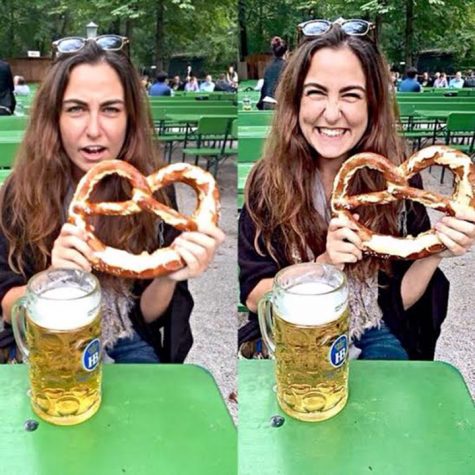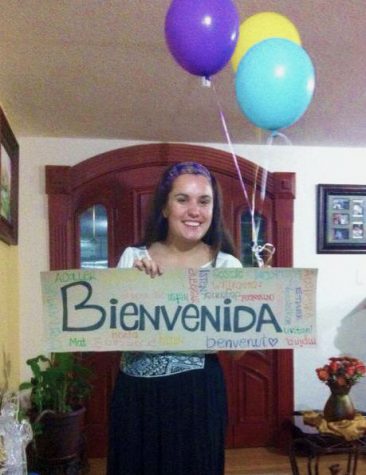KOBLENZ: 1 Month! Life in Germany So Far
Today marks the 1 month anniversary of my arrival in Koblenz! I am having a wonderful time so far. These past few weeks have been full of ups and downs, victories and defeats. I finally got over the flu with the help of some antibiotics It was a particularly nasty one and I basically spent a week catching up on classic films I haven’t seen yet because I didn’t have the energy or presence of mind to do anything else. However, by Saturday I felt much better and was able to make a last minute day trip to Trier, where one of the girls from my Wohnheim lives. She said she would show me around and she did; it’s a beautiful city! I’ll post stories and pictures shortly after this.
On Monday I finally made it back to my internship, which is going well and I am genuinely glad to be back. Currently I’m struggling with a list of exchange programs and deadlines for some 120 partner universities of the Hochschule–most of the websites aren’t in German or English, but Chinese, French, Polish, Turkish, or Portugese. Sometimes there’s no alternate language so I’ve finally discovered the best use for Google translate.
Yesterday I took a placement test to see which German course I ought to enroll in, and I didn’t do so well. If you’ve been attempting to read my entries in German, you’re probably aware that I have absolutely no idea what to do when it comes to grammar. Sure, I know where to place the verbs and how to structure the sentence, but when it comes to adjective endings or genitive or dative, I’m lost. Still, I thought my ability to understand the language and to communicate, even with the bad grammar, was enough to get me to the next step. I got placed in an A2 class, which is one step below what I took in Taos (B1).
Now, I recognize that I need to improve my grammar but I really don’t want to go down another level to do that. To be fair, the test was almost entirely grammar-based and made no attempt to gauge comprehension or communication. I was really confused after that, though, and started to wonder if I didn’t sound stupid whenever I tried to talk, or if being two steps ahead of myself all the time had finally backfired. Then I went to a youth group with a co-worker, where everyone told me my German is quite good. I’m a bit confused. In the end I’ve decided to attend one of each class to figure out where I belong. Wish me luck!
1 Month in Germany–What I’ve Learned so Far
1. A little bit about eating interdependent of the St. Edward’s dining halls. In all my excitement to finally be living on my own at St. Edward’s, I never realized just how much I relied on getting food at the dining halls. It was effortless, such that when I decided to make my own lunch or dinner it was more as a treat than a necessity. Here, of course, I have a cafeteria for lunch at the Hochschule but not for breakfast or dinner. After a month of surviving on toast or cereal for breakfast, I’ve finally broken down and bought eggs and bacon for the weekend. I am noticing for the first time that I’ve never had to cook for myself all the time and it’s been an interesting experience, considering that the items in the grocery store are much less recognizable to me than in Texas. I eat a lot of frozen pizza, soup, and pasta because I can’t figure out what else to do and tend to go for what is easiest, but that trend may soon start as I slowly learn how to cook all this strange food! By the way, one of the best decisions I’ve made as to bring my reusable Beatles grocery bag because they don’t use plastic bags here (you have to pay 20 cents for them.) It holds about a weeks’ worth of food!
2. How to use the bus system in Koblenz. This seems like an easy one to most Germans, I’m sure, but it was actually a bit difficult to figure out at first. I don’t use the bus that much in Austin and they don’t operate like this anyway. I’ve learned that the buses always arrive on time, and if there’s an accident, they simply won’t arrive at all (as opposed to being late). I know what time they arrive at and leave the bus stop by my dorm, and which lines I need to take to get various places. So far, I haven’t ended up on the wrong bus! One of the most interesting things about the bus system is that it’s really popular, because gas is so expensive a lot of people just use the buses to get around the city, but there’s no way for them to expand the narrow roads to accommodate the buses (if they wanted to, and I’m not sure that they do since they don’t appear to like the wide American roads.) This leads to interesting situations like I saw today when occasionally two buses meet going opposite directions on the same road and don’t know how to proceed because it won’t fit two buses. The two bus drivers just started signaling to each other how close they were in order not to crash both buses. It’s also complicated because the buses here are huge, with an expanding accordion-like middle section so that you get a bus twice the length of a normal one without trouble making turns.
3. Your German doesn’t have to be perfect–you just need to try to be understood. Many Germans speak English, and most of them are more than happy to have me around to help them improve it. But it is also important to respect their culture and language and speak it as much as possible. A lot of Americans make the mistake of feeling so shy about trying to speak German here that they refuse to speak it at all, but in general people here don’t mind if you make mistakes so long as you’re making the effort to speak their language. Within my first week here, I got a free contact lens case at the Optiker because I asked him questions in German, and he said that was so uncommon that an American would come in and do that. An additional note: coming to Koblenz alone has made me much more independent, both with the people I hang out with and with the language. I am not in a group of Americans and so am usually not tempted to speak too much English. I think it’s a wonderful idea to study abroad alone, because you will learn so much more that way.
4. They have ridiculously good chocolate here. Germany is apparently one of the top consumers of chocolate in the world, ahead of America ( I think they might even be in first place but I’d have to check on that.) Entire isles of their grocery stores are dedicated to selling chocolate, and it’s very very good. Kinder is a popular brand of chocolate. They make these eggs out of chocolate and inside there are prizes. I got stickers–and yes, I think the eggs are for children but my German professor told me about them so I couldn’t resist seeing it for myself! Speaking of food, they laugh at Americans for eating so much junk food and then put mayonnaise on their fries. I’m still not used to that.
5. It’s very regional. So in America, we have this idea that if you’re from the south, you behave and think in a way that is different in certain areas than those from the north or the east. If you’re from Texas, you’re something else entirely. But, it’s usually divided by region or state, not city. In Germany, every single city is different from the others and they want you to know that. Cologne insists their beer is better than the beer in Düsseldorf, and Trier is very proud of their Viez, a type of apple wine that you apparently can’t find anywhere else. Every town comes with their own dialect; for instance, one person I met remarked that the word for bread is different in Stuttgart than in Koblenz. Germans insist upon their individuality by identifying with a particular city. And don’t ask anybody outside Bavaria about that region. They’ll have very strange reactions and claim not to understand the people there at all. It’s fun to find out what is special about every city, but I can’t imagine how complicated all these dialects can get.




